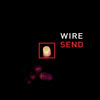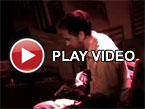Wire, "Send Ultimate"
 Wire's sudden reactivation in the early part of the 2000s was quite a welcome one. While the sporadic live shows they played during that time were refreshing, the new material that appeared with the release of the first Read and Burn EP demonstrated a true "revival" of the band, which culminated with this album. Now, seven years later, it is reissued with a second disc of harder to find and unreleased material, and sounds just as vital as it did in 2003. It also marks the end of Bruce Gilbert’s tenure with Wire, and perhaps the period with his most significant contributions to the band.
Wire's sudden reactivation in the early part of the 2000s was quite a welcome one. While the sporadic live shows they played during that time were refreshing, the new material that appeared with the release of the first Read and Burn EP demonstrated a true "revival" of the band, which culminated with this album. Now, seven years later, it is reissued with a second disc of harder to find and unreleased material, and sounds just as vital as it did in 2003. It also marks the end of Bruce Gilbert’s tenure with Wire, and perhaps the period with his most significant contributions to the band.
It seemed as if post-1977, Wire were doing all they could to escape "12XU," which endeared them to punk rockers who cared little for anything else they did during their first phase of existence.Most famously, they excised the bulk of the track from Document and Eyewitness, the audio documentation of the show that closed their first era of activity in 1980.Once it was finally released in full on 1996's Turns and Strokes, it was easy to hear the snide, sarcastic performance that was precipitated from obnoxiously yelling punks in the audience.Once into their second, more electronic pop tinged period in the 1980s, the song was all but forgotten, replaced by their then-signature song "Drill."
However, the track was once again embraced in 2001 with the "Twelve Times You" single.Presented here on the second disc, it appears in a deconstructed techno form "12 Times U" and a studio polished live take from 2000, "12 Times X."Both embraced the thrashy elements of the original, which arguably was one of the impetuses for hardcore punk, and used that energy as a blueprint for the two subsequent Read and Burn releases of new material.Not only that, but it almost seemed as if they embraced the full on adrenaline rush of Minor Threat's infamous cover of the song, as the subsequent material was some of the fastest and most dissonant material they have ever done.
Those first two Read and Burn EPs were a way for Wire to test the waters, with both being released in relatively small numbers and initially just direct from the band-run label, limiting their exposure to mostly just Wire’s core audience.Send, on the other hand, was culled from those releases, with a few tracks exclusive to its initial release.The electronic, dance oriented pop sound started with mid 1980s Wire and continued into the '90s as Wir was all but gone, replaced with a much spikier, aggressive approach that rivaled the energy of Pink Flag some 26 years before.
Most of the material here was borne out of direct collaboration between guitarist/vocalist Colin Newman and guitarist Bruce Gilbert, who both were polar opposites within the band.Geographically, this made sense, since both resided in the same city, while Graham Lewis was in Sweden, and thus contributed to a lesser degree via mail and occasional visits.Newman has never shied away from a pop song, as his solo work and Githead project clearly demonstrate.Gilbert, on the other hand, leans towards the abrasive and noise worlds, exemplified by his solo work such as In Esse, a disc that could easily be filed next to Merzbow when it comes to sound.The result is an album that shows the influence of both, and the domination of neither.The material is raw, aggressive and dissonant, but shaped into memorable, catchy songs.
Even the opening "In the Art of Stopping," which is one of the more pop-focused songs here, pounds along with a relatively simple over-driven three chord progression, Colin Newman's snide vocals, and the occasionally discordant electronic treatment, keeping it away from the traditional song structure.The superficially restrained "Mr. Marx's Table" is actually a mess of crashing digital guitars once Newman’s rather gentle vocal is pulled away.
The strongest moments are those where any sense of subtlety is ignored in favor of full on hardcore blasts.The infamous "Comet" is a simple, intentionally dumb slab of punk that belies the artistic depth of Wire, which is what makes it so great.How anyone could dislike a song about an apocalyptic event where the chorus is "And the chorus goes….ba-ba-ba-ba-ba-bang" is beyond me, and said persons will probably never be my friend.The following "The Agfers of Kodack" represents a thematic continuation of sorts, with Graham Lewis' vocals once again from the perspective of a war reporter (see Pink Flag's "Reuters" and "The First Letter" by Wir for other variations on the theme).The song has all of the heaviness of "Comet" but an entirely different vibe to it."Spent" is my favorite of all the aggressive tracks here, and on my short list of all time favorite Wire songs.Opening with Newman's snarling, vitriolic voice and layers of guitar slowly being placed, one atop another, until Robert Grey's drums fully kick in about a third of the way through the track.It comes across as so raging and disgusted, but with such intricate layering and processing to the sound, it’s far more than just pure aggression.
Not only are there the aggressive tracks, but those that are the thorny, abstract blobs that exist between the "songs"."Nice Streets Above," for example, is based on a loop taken from a live recording of "Drill" on which guitar that doesn't sound like guitar is piled, resembling a harsh electronic collage (with a beat).The painfully short "Half Eaten" has some extremely uncommon Bruce Gilbert vocals, heavily effected and buried in a swamp of nails and battery acid, resulting in a song that owes more to the work he and Lewis did as Dome than anything else on the album.The long closer "99.9" works nicely as a culmination of the album:initially building on the slow burn of a synthesizer and Newman’s vocals, which go from calm and restrained to fully unhinged when the piece brings in Grey’s pounding drums and even more pieces of spiny, distorted guitar.Traditionally, Wire albums had at least one long, difficult moment, and on this one it was "99.9."
The first disc is the exact same, content wise, as the original issue from 2003.This is not a good thing.Surprisingly, that album had a noticeable share of mastering issues, specifically a lot of digital clipping from being mastered too loudly.The bass swells in "Nice Streets Above" is one of the best examples of this:on Send it clearly becomes distorted from clipping, while the recording on Read and Burn 2 does not.I was hoping that this (and other related issues) would be fixed on this newer edition, but they linger.
The second disc, in addition to the aforementioned "Twelve Times You" single, compiles the Read and Burn songs that didn't make the cut for Send, but none of which are lacking."I Don't Understand," from the first EP, is cut from a similar cloth as "The Agfers of Kodack," but with the disgusted thrust of "Spent."How this ended up on a Victoria's Secret commercial still baffles me some three years after the fact."Trash/Treasure" was left off the album because it is far too pretty of a pop song to fit in with all the dissonance and thrash.From a melodic perspective, it owes a great deal to A Bell is a Cup era Wire, but with the ambience of Send.The short "Raft Ants" is one that could have fit nicely on there, however, with its machine gun pace and noise guitar.Given Newman's free association lyrics, it does sound like Motörhead covering "Kidney Bingos."
The newly released material shows gives some good insight into the development of what became the album."Artificial Gravity" is an instrumental (with the exception of Newman growling the title sporadically like a German Gabber DJ) that sounds like the nascent idea behind "Nice Streets Above" but more repetitious with a bit of the melody of "Trash/Treasure" thrown in.This ended up being reworked into "You Can’t Leave Now" on the album, which is a drastic change."DJ Fuckoff" is a 2000 performance of "Drill" mutilated into a sample collage with a techno beat.It's understandable why it never really evolved past what it is, but that doesn't stop it from being entertaining.
Two songs that eventually appeared on the post-Send Read and Burn 3 EP were in their demo form at this time:"Our Time" is a more rudimentary mix with a bit more breathing room than the final take, but is almost fully formed."Desert Diving" has a similarly complete feel, though it appears here with more of an ambient techno synth backing.It doesn’t drastically differ from the completed take, but I still prefer the final one.
I do wonder what spurred this project on, considering the relatively relatively recent appearance of Send, at least compared to other albums in Wire’s discography. To their argument Send did slip out of print however the aforementioned mastering issues weren't addressed.Extremely devoted Wire fans will probably already have almost everything here.I personally missed the 7" and Read and Burn 2 due to being completely broke when they were released, and not being able to track them down reasonably priced since then, so I was glad to have good recordings of them.Personally, I'd really like to see some of those rarities from the 1970s made available again, such as the singles/B-sides that were pulled off the recent remasters of those albums, or perhaps some unreleased 1980s material.As it stands, Send is still a brilliantly acerbic disc and, although the more pop oriented Object 47 has grown on me in the two years since its release, I still favor the more challenging material here.
samples:
 




